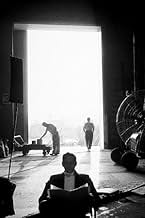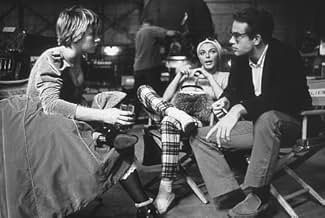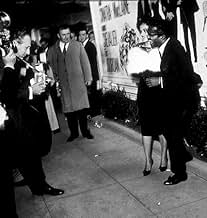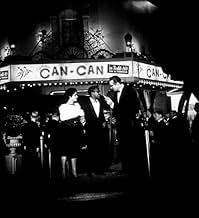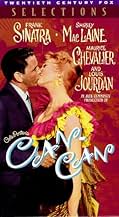Can-Can
- 1960
- Tous publics
- 2h 11m
IMDb RATING
6.3/10
2.6K
YOUR RATING
In 1896 Paris, a female nightclub proprietor fights against the forces of public morality for the right to feature her performers doing the risqué dance, the Can-Can.In 1896 Paris, a female nightclub proprietor fights against the forces of public morality for the right to feature her performers doing the risqué dance, the Can-Can.In 1896 Paris, a female nightclub proprietor fights against the forces of public morality for the right to feature her performers doing the risqué dance, the Can-Can.
- Director
- Writers
- Stars
- Nominated for 2 Oscars
- 5 wins & 7 nominations total
Frank Baker
- Party Guest
- (uncredited)
Benjie Bancroft
- Club Patron
- (uncredited)
Herman Belmonte
- Waiter
- (uncredited)
Shirley Blackwell
- Townsfolk
- (uncredited)
Eugene Borden
- Police Officer Chevrolet
- (uncredited)
Buddy Bryan
- Dancer
- (uncredited)
Carole Bryan
- Gigi
- (uncredited)
- Director
- Writers
- All cast & crew
- Production, box office & more at IMDbPro
Featured reviews
Strangely enough, the weakest aspect of this musical is the quality of the songs. Most of them are fairly mediocre, and fail to stay in the memory for long. But otherwise, "Can-Can" is a smashing entertainment. Lavishly produced and gorgeously photographed, this is one expensive movie where the money were spent with care and taste (unlike, for example, "Gentlemen Prefer Blondes" which, despite its big budget, looked cheap). The story may be a little thin, but it's suspenseful, too: you can never predict with absolute certainty if MacLaine will choose Sinatra (who is wonderful) or Louis Jourdan (who is as sly and charming as he was when he played the villain in "Octopussy"). But above everything else, this movie is a feast for the eyes!
'Can-Can' from personal opinion is one of Cole Porter's best later musicals, and there was so much talent involved in this film. It's just sad that something that should have sparkled like diamonds fell as flat as over-egged soufflé despite some very great things.
There's more to the problem than it being a butchered treatment of the Broadway hit, including a mangled re-written story with an additional character to cater Frank Sinatra, omitted songs and changes to lyrics. Pretty much all of the problems with 'Can-Can' are to do with how it fared on its own terms, which is while nowhere near one of the duds in musicals it's one of the classics either, if anything a missed opportunity.
Despite how this all sounds there is a good amount to like about 'Can-Can'. The film is visually stunning, opulently produced and photographed with spectacular gorgeousness. Porter's music and songs, even with how they're treated (most inexplicable being the lyric liberties in the title song, the original ones are brilliant and part of what makes 'Can-Can' one of Porter's better later musicals), are still superb. Especially the very touching "It's All Right With Me", sung (or crooned) beautifully by Sinatra.
Parts of the script has wit and charm, especially with Maurice Chevalier. Chevalier and Louis Jourdan give the film's two best performances, the former performing with a humorous twinkle and effortless charm and the latter having an urbane likability. Juliet Prowse also proves herself to be a wonderful dancer, and the choreography and musical numbers are really where 'Can-Can' really picks up in the interest value.
Yet, 'Can-Can', despite the music, Chevalier and Jourdan and the production values, never makes one properly feel like they've been transported to late 19th century Paris. Part of it is to do with the mostly anachronistic and talky script (especially in the courtroom parts that really dragged the film down pace-wise), and a larger part is do with the miscasting of the two leading roles. There is no denying that Sinatra sings beautifully with impeccable phrasing and breath control, but he is too contemporary and completely fails to bring personality, let alone any endearing traits, to a total sleazebag of a character. Shirley MacLaine is also too American, annoyingly shrill and doesn't look like her heart was completely in it.
As a result of the numerous changes, despite some moments, the story suffers consequently, the material needed more wit, emotion and life than what the film provides. Sluggish pacing in the non-musical moments and a rather too overlong length doesn't help. It's indifferently directed, the "Garden of Eden" sequence despite great dancing and choreography is overblown and goes on for far too long and the ending, with Simone's decision completely ringing false, feels like a cheat.
On the whole, some definite great things but considering the source material and talent 'Can-Can' should have sparkled so much more. 5/10 Bethany Cox
There's more to the problem than it being a butchered treatment of the Broadway hit, including a mangled re-written story with an additional character to cater Frank Sinatra, omitted songs and changes to lyrics. Pretty much all of the problems with 'Can-Can' are to do with how it fared on its own terms, which is while nowhere near one of the duds in musicals it's one of the classics either, if anything a missed opportunity.
Despite how this all sounds there is a good amount to like about 'Can-Can'. The film is visually stunning, opulently produced and photographed with spectacular gorgeousness. Porter's music and songs, even with how they're treated (most inexplicable being the lyric liberties in the title song, the original ones are brilliant and part of what makes 'Can-Can' one of Porter's better later musicals), are still superb. Especially the very touching "It's All Right With Me", sung (or crooned) beautifully by Sinatra.
Parts of the script has wit and charm, especially with Maurice Chevalier. Chevalier and Louis Jourdan give the film's two best performances, the former performing with a humorous twinkle and effortless charm and the latter having an urbane likability. Juliet Prowse also proves herself to be a wonderful dancer, and the choreography and musical numbers are really where 'Can-Can' really picks up in the interest value.
Yet, 'Can-Can', despite the music, Chevalier and Jourdan and the production values, never makes one properly feel like they've been transported to late 19th century Paris. Part of it is to do with the mostly anachronistic and talky script (especially in the courtroom parts that really dragged the film down pace-wise), and a larger part is do with the miscasting of the two leading roles. There is no denying that Sinatra sings beautifully with impeccable phrasing and breath control, but he is too contemporary and completely fails to bring personality, let alone any endearing traits, to a total sleazebag of a character. Shirley MacLaine is also too American, annoyingly shrill and doesn't look like her heart was completely in it.
As a result of the numerous changes, despite some moments, the story suffers consequently, the material needed more wit, emotion and life than what the film provides. Sluggish pacing in the non-musical moments and a rather too overlong length doesn't help. It's indifferently directed, the "Garden of Eden" sequence despite great dancing and choreography is overblown and goes on for far too long and the ending, with Simone's decision completely ringing false, feels like a cheat.
On the whole, some definite great things but considering the source material and talent 'Can-Can' should have sparkled so much more. 5/10 Bethany Cox
The performers do not sing Cole Porter the way the best of singers can sing Cole Porter. Doris Day in "Lullaby of Broadway" sings "Just one of those things" wearing a tuxedo in a way that outshines Maurice Chevalier. Bob Hope singing "You do something to me" excels in a way that Louis Jordan cannot. Frank Sinatra and Shirley McClain singing "Let's do it" ends up as tepid as it gets as compared to almost anyone else's rendition. That these are all masters of the singer's craft makes for an astounding realization--the knack for singing a Cole Porter song is not for everyone or for every vehicle. One wonders how other singers handle interpretation of these songs in the same play. The movie was disappointing because the performances were disappointing.
"Can-Can" is a feeble and obvious attempt to match the wit and high professional gloss of "Gigi." The cast even included Maurice Chevalier, still enjoying the quiet pleasures of old age as a tolerant judge named Paul Barriere, and Louis Jourdan, cast here as an upright young judge named Philippe Forrestier
After Judge Forrestier becomes amorously involved with the café owner Simone Pistache (Shirley MacLaine), and legally involved with her shifty lawyer boyfriend (Frank Sinatra), he is no longer the same man
"Can-Can" is a musical film that virtually embodies the reasons for the decline of the genre in the sixties Except for its appropriately gaudy costumes and for the exuberant performance by dancer Juliet Prowse as a cancan girl, the musical is without joy or genuine style under Walter Lang's unfocused direction
The Cole Porter score reveals the composer at his most ersatz Parisian The two of the central roles are grotesquely miscast: Sinatra, who seems to have arrived to Paris by way of New Jersey, creates no discernible or even vaguely likable character in François MacLaine does well in the musical portions, but her Pistache is simply shrill and unappealing Maurice Chevalier and Louis Jourdan work hard at injecting some life into the dull proceedings Chevalier with his trademark shrugged-shoulders, laissez-faire attitude toward life and love, expressed to such songs as "Live and Let Live" and "Just One of Those Things," and Louis Jourdan with the French charm he displayed so prominently in "Gigi."
For all their efforts, however, Can-Can emerges as a flat soufflé
"Can-Can" is a musical film that virtually embodies the reasons for the decline of the genre in the sixties Except for its appropriately gaudy costumes and for the exuberant performance by dancer Juliet Prowse as a cancan girl, the musical is without joy or genuine style under Walter Lang's unfocused direction
The Cole Porter score reveals the composer at his most ersatz Parisian The two of the central roles are grotesquely miscast: Sinatra, who seems to have arrived to Paris by way of New Jersey, creates no discernible or even vaguely likable character in François MacLaine does well in the musical portions, but her Pistache is simply shrill and unappealing Maurice Chevalier and Louis Jourdan work hard at injecting some life into the dull proceedings Chevalier with his trademark shrugged-shoulders, laissez-faire attitude toward life and love, expressed to such songs as "Live and Let Live" and "Just One of Those Things," and Louis Jourdan with the French charm he displayed so prominently in "Gigi."
For all their efforts, however, Can-Can emerges as a flat soufflé
What does an old musical set in France need? Maurice Chevalier and Louis Jourdan, of course! And since there's also singing and a cute dancer who likes showing off her legs, what else does it need? Frank Sinatra and Shirley MacLaine! Can-Can has Shirley, both French charmers, and Ol' Blue Eyes.
Set in the 1800s, when the can-can dance was forbidden in France because it was too risqué, Shirley MacLaine decides to buck the system and allows her and her nightclub dancers show off their legs. Lots of dancing from choreographer Hermes Pan, lots of pretty costumes, lots of Cole Porter songs, and a love triangle that will keep you on the edge of your seat the entire time, Can-Can is definitely one to see if you like old musicals. I've seen them all, and while this one doesn't make it to the top shelf in my collection, I'm glad I saw it. Many famous songs come from this movie, including "I Love Paris", "Let's Do It", "Just One of Those Things", and "It's All Right With Me", so if you like any of those, rent it during your next musical-fest weekend.
Set in the 1800s, when the can-can dance was forbidden in France because it was too risqué, Shirley MacLaine decides to buck the system and allows her and her nightclub dancers show off their legs. Lots of dancing from choreographer Hermes Pan, lots of pretty costumes, lots of Cole Porter songs, and a love triangle that will keep you on the edge of your seat the entire time, Can-Can is definitely one to see if you like old musicals. I've seen them all, and while this one doesn't make it to the top shelf in my collection, I'm glad I saw it. Many famous songs come from this movie, including "I Love Paris", "Let's Do It", "Just One of Those Things", and "It's All Right With Me", so if you like any of those, rent it during your next musical-fest weekend.
Did you know
- TriviaIt is explained in the film that the can-can was considered a lewd and lascivious dance (in reality often performed without panties).
- GoofsAbout 34 minutes in, when Philipe tries to close the window in Simone's boudoir, the whole wall shakes as he struggles with the window, indicating that it is a set wall and not a real building.
- Quotes
François Durnais: You look like a broken umbrella.
- Crazy creditsOpening credits prologue: Montmartre-1896
- ConnectionsFeatured in 20th Century-Fox: The First 50 Years (1997)
- SoundtracksI Love Paris
(uncredited)
Music by Cole Porter
Lyrics by Cole Porter
Sung by chorus over the beginning and end credits
- How long is Can-Can?Powered by Alexa
Details
- Release date
- Country of origin
- Official site
- Languages
- Also known as
- Jack Cummings' Production of Cole Porter's Can-Can
- Filming locations
- Paris, France(stock footage of the evening barge sequences)
- Production company
- See more company credits at IMDbPro
Box office
- Budget
- $6,000,000 (estimated)
- Runtime2 hours 11 minutes
- Aspect ratio
- 2.20 : 1
Contribute to this page
Suggest an edit or add missing content





